Toyota bZ4X VS Toyota C-HR – Specs, Efficiency & Price Comparison
Find out now which car fits your needs better!
The Toyota bZ4X (SUV) is powered by a Electric engine and comes with a Automatic transmission. In comparison, the Toyota C-HR (SUV) features a Full Hybrid or Plugin Hybrid engine and a Automatic gearbox.
When it comes to boot capacity, the Toyota bZ4X offers 452 L, while the Toyota C-HR provides 447 L – depending on what matters most to you. If you’re looking for more power, you’ll need to decide whether the 218 HP of the Toyota bZ4X or the 223 HP of the Toyota C-HR suits your needs better.
There are also differences in efficiency: 14.40 kWh vs 0.80 L. In terms of price, the Toyota bZ4X starts at 36800 £, while the Toyota C-HR is available from 29100 £.
Compare all the key specs now and find out which model fits your lifestyle best!
In an intriguing showdown between two distinctive Toyota models, the C-HR and the bZ4X, driving enthusiasts will find themselves captivated by the blend of style and innovation each offers. While the C-HR boasts a sporty design and agile handling perfect for urban commuting, the all-electric bZ4X stands out with its bold aesthetic and eco-friendly performance. This comparison not only highlights the evolution of Toyota's offerings but also showcases the brand's commitment to catering to diverse customer preferences in an increasingly competitive automotive landscape.
Toyota bZ4X
The Toyota bZ4X represents a bold step forward in the brand's commitment to electric mobility, showcasing an innovative design that merges futuristic aesthetics and functionality. Inside, the spacious cabin is thoughtfully crafted to provide comfort and advanced technology, ensuring a pleasurable driving experience. With its impressive range and sustainable vision, the bZ4X sets a new benchmark for environmentally conscious driving without compromising on performance or style.
details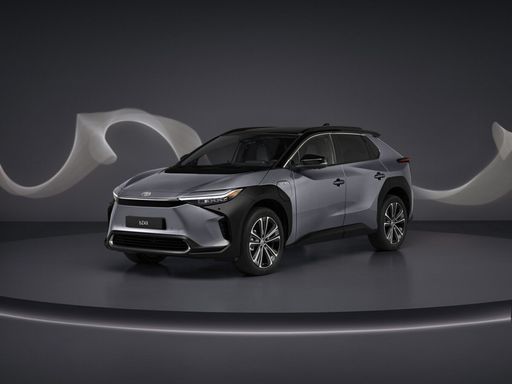 @ Toyota
@ Toyota
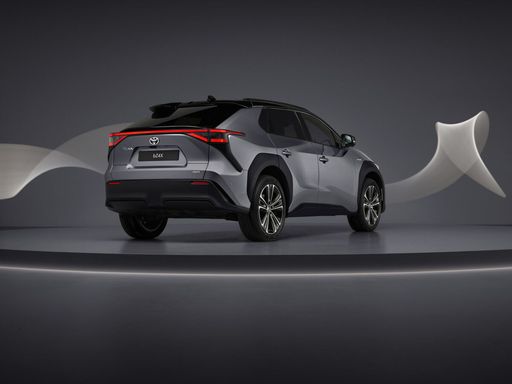 @ Toyota
@ Toyota
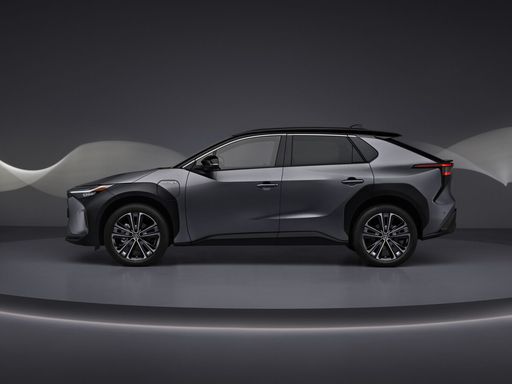 @ Toyota
@ Toyota
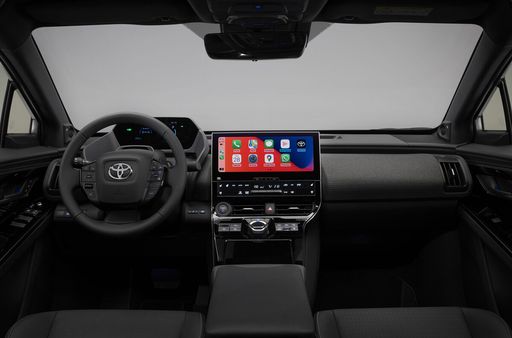 @ Toyota
@ Toyota
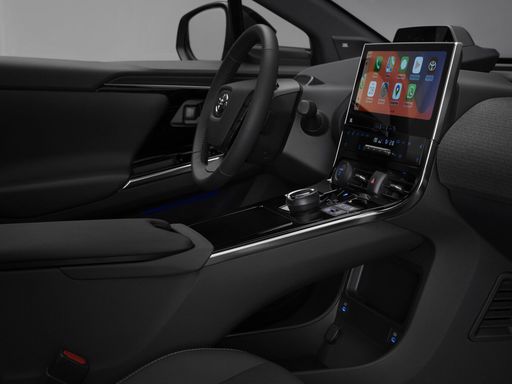 @ Toyota
@ Toyota
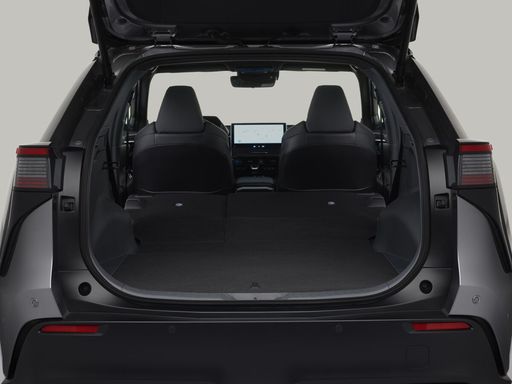 @ Toyota
@ Toyota
Toyota C-HR
The Toyota C-HR stands out with its distinctive and bold design that combines sleek, angular lines with a sporty posture. Its comfortable and stylish interior is equipped with advanced technology features, providing a seamless driving experience. The vehicle offers impressive handling and performance, making it a compelling choice for those who appreciate a blend of practicality and flair on the road.
details @ Toyota
@ Toyota
 @ Toyota
@ Toyota
 @ Toyota
@ Toyota
 @ Toyota
@ Toyota
 @ Toyota
@ Toyota
The automotive landscape is undergoing a dramatic transformation, with SUVs and electric vehicles taking center stage. Toyota has embraced this shift with two prominent models: the versatile Toyota C-HR and the innovative bZ4X. In this comparison, we will explore the two models' technical aspects, innovations, and suitability for different driving needs.
Design and Dimensions
Starting with the Toyota C-HR, its compact and sporty design makes it an eye-catching choice in the SUV segment. Measuring 4,362 mm in length, 1,832 mm in width, and 1,558 mm in height, the C-HR boasts a stylish aesthetic coupled with functional dimensions. The 5-door setup provides ample room for up to five passengers, with a trunk capacity ranging between 350 to 447 liters, depending on the variant.
On the other hand, the Toyota bZ4X has a more substantial presence, featuring a length of 4,690 mm, a width of 1,860 mm, and a height of 1,600 mm. Its more extensive dimensions not only enhance its imposing visual appeal but also contribute to a spacious interior, with a trunk capacity of 452 liters. The bZ4X's futuristic design symbolizes Toyota's commitment to sustainability and innovation in electric mobility.
Powertrains and Performance
The Toyota C-HR offers a range of hybrid options, including full hybrid and plug-in hybrid powertrains. With power ratings ranging from 140 HP to 223 HP, it provides flexibility for consumers seeking efficiency or spirited performance. The models come with an automatic CVT transmission and can be configured in front-wheel drive (FWD) or all-wheel drive (AWD). Acceleration from 0-100 km/h varies between 7.4 to 9.9 seconds, highlighting the agile capabilities of this SUV.
In contrast, the Toyota bZ4X operates solely as an electric vehicle, delivering power outputs of 204 HP and 218 HP. The use of a reduction gearbox ensures smooth power delivery, while its range of 461 to 513 km on a single charge makes it a formidable contender in the EV segment. Acceleration, impressive for an electric vehicle, can reach 0-100 km/h in as little as 6.9 seconds, showcasing its performance prowess.
Efficiency and Sustainability
When it comes to efficiency, the Toyota C-HR maintains a commendable fuel consumption of 4.7 to 5.1 L/100km, depending on the powertrain variant. Its CO2 emissions range from 17 to 115 g/km, which aligns with contemporary environmental standards. This makes the C-HR a suitable option for those looking to minimize their carbon footprint while enjoying the benefits of a hybrid SUV.
The bZ4X stands out in this aspect, achieving zero tailpipe emissions as an all-electric SUV. Its energy consumption ranges from 14.4 to 16.2 kWh/100km, indicating remarkable efficiency in energy use. Choosing the bZ4X means contributing to a greener future without compromising on performance or practicality.
Technological Innovations
Both models feature Toyota's latest in-car technology, designed to enhance the driving experience. The C-HR is equipped with advanced safety systems, including adaptive cruise control, lane departure alert, and pre-collision systems. The infotainment system is user-friendly, with smartphone integration capabilities to keep drivers connected on the go.
The bZ4X takes technology to the next level with its focus on electric vehicle innovation. It incorporates advanced driver assistance features, including automatic parking and a comprehensive suite of safety technologies. Its infotainment system also supports over-the-air updates, ensuring that the software remains current and that features can be added as they become available.
Conclusion: Which One is Right for You?
Choosing between the Toyota C-HR and the bZ4X ultimately comes down to individual needs and preferences. If you favor versatility, hybrid options, and a sporty SUV style, the C-HR is an excellent choice. However, for those looking to make the leap into the electric future with a spacious and innovative vehicle, the bZ4X is a compelling contender. Both models embody Toyota’s commitment to quality, efficiency, and innovation, ensuring that they cater to a wide range of drivers in today’s evolving automotive landscape.

|

|
|
|
|
Costs and Consumption |
|
|---|---|
|
Price
36800 - 45400 £
|
Price
29100 - 42800 £
|
|
Consumption L/100km
-
|
Consumption L/100km
0.8 - 5.1 L
|
|
Consumption kWh/100km
14.4 - 16.2 kWh
|
Consumption kWh/100km
-
|
|
Electric Range
461 - 513 km
|
Electric Range
68 km
|
|
Battery Capacity
-
|
Battery Capacity
-
|
|
co2
0 g/km
|
co2
17 - 115 g/km
|
|
Fuel tank capacity
-
|
Fuel tank capacity
43 L
|
Dimensions and Body |
|
|---|---|
|
Body Type
SUV
|
Body Type
SUV
|
|
Seats
5
|
Seats
5
|
|
Doors
5
|
Doors
5
|
|
Curb weight
1970 - 2085 kg
|
Curb weight
1505 - 1755 kg
|
|
Trunk capacity
452 L
|
Trunk capacity
350 - 447 L
|
|
Length
4690 mm
|
Length
4362 mm
|
|
Width
1860 mm
|
Width
1832 mm
|
|
Height
1600 mm
|
Height
1558 - 1564 mm
|
|
Payload
465 - 495 kg
|
Payload
375 - 425 kg
|
Engine and Performance |
|
|---|---|
|
Engine Type
Electric
|
Engine Type
Full Hybrid, Plugin Hybrid
|
|
Transmission
Automatic
|
Transmission
Automatic
|
|
Transmission Detail
-
|
Transmission Detail
-
|
|
Drive Type
Front-Wheel Drive, All-Wheel Drive
|
Drive Type
Front-Wheel Drive, All-Wheel Drive
|
|
Power HP
204 - 218 HP
|
Power HP
140 - 223 HP
|
|
Acceleration 0-100km/h
6.9 - 7.5 s
|
Acceleration 0-100km/h
7.4 - 9.9 s
|
|
Max Speed
160 km/h
|
Max Speed
175 - 180 km/h
|
|
Torque
265 - 336 Nm
|
Torque
-
|
|
Number of Cylinders
-
|
Number of Cylinders
4
|
|
Power kW
150 - 160 kW
|
Power kW
103 - 164 kW
|
|
Engine capacity
-
|
Engine capacity
1798 - 1987 cm3
|
General |
|
|---|---|
|
Model Year
2024 - 2025
|
Model Year
2024 - 2025
|
|
CO2 Efficiency Class
A
|
CO2 Efficiency Class
C, B
|
|
Brand
Toyota
|
Brand
Toyota
|
Toyota bZ4X
A New Era with the All-Electric Toyota bZ4X
The Toyota bZ4X is a groundbreaking addition to the world of electric vehicles. This 2024 SUV promises to combine cutting-edge technology, an environmentally friendly powertrain, and exquisite design, representing Toyota's ambitious journey towards a sustainable future. Let's delve into its technical highlights and revolutionary innovations.
Performance and Efficiency
The Toyota bZ4X is available with two powertrain options: front-wheel drive and all-wheel drive. The front-wheel-drive model boasts a power output of 204 PS (150 kW), while the all-wheel-drive variant offers slightly more power at 218 PS (160 kW). Both setups utilise an efficient reduction gear transmission, allowing for smooth acceleration and optimal power delivery.
In terms of energy consumption, the bZ4X demonstrates impressive efficiency. The front-wheel-drive variants consume 14.4 kWh/100 km, whereas the all-wheel-drive versions utilise 16.2 kWh/100 km. This efficiency translates to an electric range of 461 to 513 km, positioning the bZ4X as a formidable competitor in the electric SUV market.
Innovative Design and Comfort
Emphasising design and passenger comfort, the Toyota bZ4X presents a spacious interior that accommodates five passengers comfortably. With a length of 4690 mm, a width of 1860 mm, and a height of 1600 mm, the bZ4X provides generous headroom and legroom, along with a practical boot capacity of 452 litres.
Available in multiple trim levels, including Comfort, Lounge, and Team Deutschland, each model offers a host of advanced features designed to enhance the driving experience. From intuitive infotainment systems to luxurious upholstery, the bZ4X prioritises driver satisfaction and convenience.
Technological Advancements
The Toyota bZ4X is equipped with state-of-the-art technology that enhances both safety and driving pleasure. It includes a full suite of driver assistance systems and cutting-edge connectivity features. Toyota's dedication to safety is further exemplified by the car's superior build quality and a CO2-efficiency class of A, ensuring zero emissions during operation.
Ready for the Future
As environmental concerns continue to shape the automotive industry, the Toyota bZ4X stands out as a remarkable response to these challenges. With pricing ranging from €42,900 to €52,990, this model ensures that eco-conscious consumers do not have to compromise on performance, technology, or style.
The Toyota bZ4X not only embodies the brand’s commitment to a sustainable future but also sets a new benchmark for what electric SUVs can achieve. Its combination of robust performance, innovative design, and environmental efficiency signifies a promising step forward in the realm of electric mobility.
Toyota C-HR
Revolutionising the Crossover Segment: The Toyota C-HR
The Toyota C-HR has firmly established itself as a standout contender in the compact crossover segment. Known for its distinct design and hybrid capabilities, the C-HR continues to prioritise innovation and efficiency. In this article, we delve into the technical details that make the 2024 iteration a compelling choice for discerning buyers.
Distinctive Design and Aerodynamics
The Toyota C-HR boasts a striking design that combines angular lines with modern aesthetics. This isn't merely for show; the design enhances aerodynamics, improving fuel efficiency and handling. With dimensions of 4362mm in length and a sophisticated structure, the C-HR strikes a balance between urban agility and on-road stability.
Impressive Hybrid Powertrains
The C-HR lineup offers innovative hybrid and plug-in hybrid drivetrain options. The full hybrid system is tailored for those who seek both economic and environmental benefits. It combines a petrol engine with an electric motor to deliver power outputs ranging from 140 to 223 PS, achieving remarkable fuel consumption rates from 0.8 to 5.1 L/100km. The 2.0 Plug-In Hybrid variant impresses with an electric range of 67 km, ideal for urban commuters.
Unmatched Efficiency and Performance
Acceleration figures for the C-HR range from 7.4 to 9.9 seconds to reach 0-100 km/h, ensuring a responsive driving experience. Maximum speeds between 175 and 180 km/h cater to those who appreciate a bit of zest on the open road. Coupled with CVT automatic transmission and both front-wheel and all-wheel-drive configurations, the C-HR adapts to various driving conditions with ease.
Advanced Technology and Features
Inside, the C-HR is equipped with the latest technology aimed at providing connectivity and comfort. The model hosts an array of features across its diverse trim levels, including Business Edition, Lounge, and the sporty GR SPORT. Each variant is designed to meet the demands of different lifestyles, ensuring there's a C-HR model to suit every taste.
Sustainability and Cost Efficiency
With CO2 emissions ranging from 19 to 115 g/km, the C-HR stands as a testament to Toyota's commitment to sustainability. Financially savvy consumers will also appreciate the running cost, with monthly expenses from €959 to €1204, and a cost per km as low as 38.4 cents. Such efficiency makes the vehicle an attractive option for eco-minded buyers.
Conclusion: A Forward-Thinking Choice
The 2024 Toyota C-HR embodies Toyota's forward-thinking approach to automotive innovation, blending eco-friendly hybrid technologies with stylish design and practicality. It offers a glimpse into the future of driving, where efficiency meets elegance. Whether you're a city dweller or an adventure seeker, the C-HR promises a driving experience that is both enjoyable and environmentally conscious.
The prices and data displayed are estimates based on German list prices and may vary by country. This information is not legally binding.
